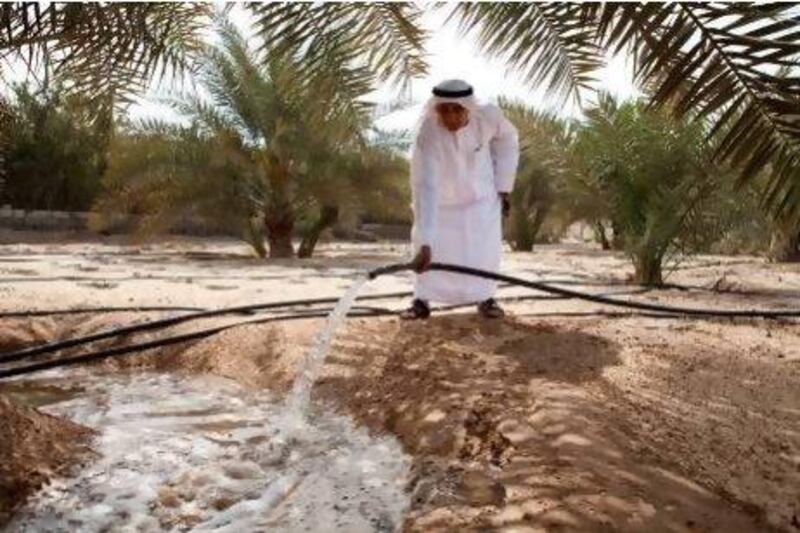ABU DHABI // Water supplies from the ground are at risk of running out within the next 55 years if the same amount is extracted each year, authorities say.
And a forecast lack of rain this year further threatens the supply.
"Rainfall has a lot of benefits because it recharges the aquifer system," said Dr Mohamed Dawoud, manager of water resources at the Environment Agency - Abu Dhabi.
"So if we continue abstracting the same amount of water from the ground and it doesn't rain, this can be very detrimental."
Water consumption for irrigation in farms is about 1.5 billion cubic metres per year, or 50 per cent of total consumption in the emirate.
The aquifer system, a layer in the soil that stores water in its pores, is recharged with 90 billion cubic metres a year from the country's 114 dams and the Hajar Mountains on the east coast.
But with Abu Dhabi alone taking out 2.1 billion cubic metres a year, it will take only 55 years before the groundwater is exhausted.
Dr Dawoud said cutting the amount of water wasted by limiting the number of new wells, reducing the amount taken out and using new irrigation technologies could extend the aquifer reserve to 100 years.
One of the solutions the agency is working on is improving the quality of treated wastewater so it can be used more for agriculture.
"After treating it to a quality which allows us to use it safely, with no harm and health risks, we can use it instead of groundwater," said Dr Dawoud.
The Abu Dhabi Food Control Authority will soon start irrigating 216 farms with wastewater that has been filtered and treated with ultraviolet light.
For now, treated wastewater is not suitable for edible crops, which limits its use to landscaping and recreational areas. They are looking at a process called reverse osmosis, a filter that removes particles, to produce potable water.
Others have expressed interest in the technique. Alan Thomson, manager of the Abu Dhabi Sewerage Services Company, which owns 38 wastewater-treatment plants, believes it could have potential.
"If it [the Abu Dhabi Government] takes that decision, it will be a good one," Mr Thomson said.
Metito, a Dubai water-treatment company, is also considering reverse osmosis. It already uses treated sewage for district cooling, said Samer Yousef, its senior operations and maintenance manager.
Empower is already using some polishing plants, which treat sewage enough for district cooling - and the plan is for all district cooling to use treated wastewater within a few years. "Usually, it's used from potable water which is a big waste," said Mr Yousef.
Metito built a sewage polishing plant on the Palm Jumeirah in 2009 but it has not been used yet because so much water is used for irrigation and there is no excess.
The longer-term aim is to generate drinking water. That, though, remains a way off. "The culture is changing little by little and later on, it will be accepted for human consumption, for agricultural human purposes and drinking," said Mr Yousef. "But it could take a decade or more."
He expects some resistance. In the UAE, he said, the idea of drinking, showering and cooking with sewage "is not acceptable."
For now, the UAE will have to consider other sources. Desalinated water could be mixed with groundwater to reduce the pressure on its aquifer system.
"It can be done and there are plans in the future to minimise its wastage," said Dr Dawoud.
Next May, the agency will begin using treated wastewater from its 32 plants in agriculture - effectively giving the UAE an extra 100 million cubic metres of water a year. That, insists Dr Dawoud, "will not have any [negative] health impacts."
In an effort to conserve dwindling supplies, the Cabinet last month banned the export of bottled groundwater.
It followed a recommendation from the Federal National Council, and a plea to the minister to help the UAE's drought-hit farms.
"Thank God, this is a great step - all this only from a small question," Musabah Al Kitbi, an FNC member from Sharjah, said after the ban. He believes media coverage of the debate also pushed the problem to the Cabinet's attention.
But with only 16 billion cubic metres of freshwater left in the UAE - much of the available water is brackish - the situation is pressing. "We are now recommended not to use freshwater for man-made activities in the future," said Dr Dawoud. "We have to keep it as a strategic reserve."






